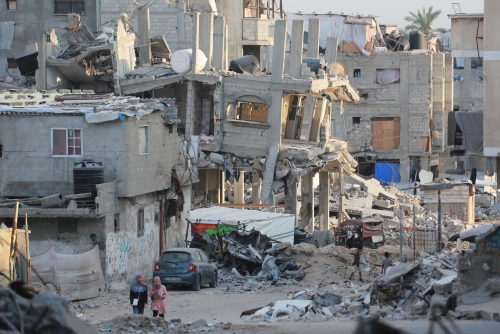Israel Investigates Possible Killing of Hamas Leader Yahya Sinwar in Gaza Operation
AFP | Gaza
The Daily Tribune - www.newsofbahrain.com
Email: mail@newsofbahrain.com
Israel announced yesterday that it is investigating whether Yahya Sinwar, the leader of Hamas, was killed in a recent military operation in Gaza. Sinwar, accused by Israel of orchestrating the deadly October 7, 2023, attack, has been a primary target in Israel's ongoing efforts to dismantle Hamas.
Sinwar took over leadership of the Iran-backed Palestinian group following the death of former political chief Ismail Haniyeh in July. While Hamas and Iran blame Israel for Haniyeh’s assassination in Tehran, Israel has not confirmed its involvement.
This potential strike on Sinwar comes shortly after Israel assassinates Hezbollah chief Hassan Nasrallah in Lebanon, amidst ongoing military escalations since September. Several other commanders linked to Iran-backed militias have also been eliminated in recent months.
Earlier this year, Israel reported the death of Mohammed Deif, Hamas’s military leader, though Hamas has not confirmed the claim. Deif and Sinwar were believed to have collaborated on the October 7 attack, which marked the deadliest assault in Israeli history.
If Sinwar’s death is confirmed, it would represent a major blow to Hamas, which has already suffered heavy losses over a year into the Gaza war. Israeli defense forces confirmed that three Hamas members were killed in the latest operation, and DNA tests are being conducted to determine if one of the bodies is that of Sinwar.
Israel’s Defense Minister Yoav Gallant emphasized in a post on X, formerly Twitter, that the country is committed to eliminating all Hamas fighters. Meanwhile, U.S. President Joe Biden was briefed on the developments as he traveled to Germany.
Wider Conflict Escalates Across the Region
Israel has been engaged in full-scale conflict with Hamas since the October 7 attack, which claimed the lives of over 1,200 people, predominantly civilians, according to Israeli officials. Israel's military response has resulted in the deaths of more than 42,000 people in Gaza, with the majority being civilians, according to reliable data from Gaza’s health ministry, which is recognized by the UN.
In the aftermath of the October attack, Israeli Prime Minister Benjamin Netanyahu vowed to destroy Hamas and recover the 251 hostages taken by militants during the assault. In addition to Gaza, Israel has expanded its operations into Lebanon, where Hezbollah, a Hamas ally, opened a second front with cross-border strikes. Netanyahu has pledged to defeat Hezbollah, and Israeli forces launched airstrikes on the southern Lebanese city of Tyre, a Hezbollah stronghold.
Evacuation warnings have also been issued for civilians in parts of Lebanon’s Bekaa Valley, and Israel has targeted Hezbollah positions in Syria, while U.S. forces conducted airstrikes on rebel targets in Yemen.
These interconnected conflicts, involving Iran-backed militias in Gaza, Lebanon, Syria, and Yemen, are part of a broader "axis of resistance" against Israel. Iran has also entered the fray, launching a missile strike on Israel earlier this month. Israel has vowed retaliation, raising fears of a broader regional war.
Iran’s Revolutionary Guards Chief Hossein Salami warned that Tehran would retaliate "painfully" against any Israeli attacks on its targets, intensifying concerns of an escalating regional conflict.
Related Posts

